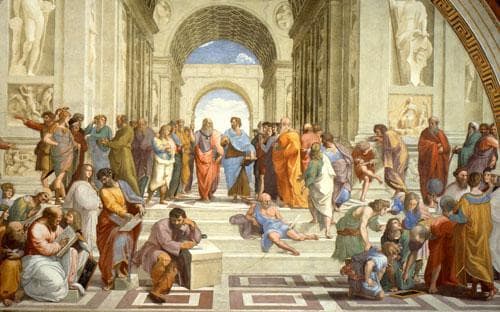Advertisement
How to Live an Examined Life
ResumeWe talk about a dozen great philosophers, from Socrates on, and how they actually lived.

For long, great ages, people looked to philosophers to ask how to live and what our priorities should be. Our principles. Our guiding stars. And they looked not just to what philosophers said or wrote, but to how they lived and even died.
When Socrates said the unexamined life is not worth living, he laid out the fundamental philosopher’s view. When he calmly accepted a death sentence in a cup of hemlock, he left a story of philosophy in action that's been repeated and celebrated for eons.
James Miller has gathered the teachings and life stories of a dozen philosopher greats. From the ancients to Kant, Emerson to Nietzsche, we look at what they taught, how they lived.
-Tom Ashbrook
Guest:
James Miller, professor of politics and chair of liberal studies at the New School for Social Research. His new book is “Examined Lives: From Socrates to Nietzche."
Excerpt from Miller's "Examined Lives":
If, like Plato, we define philosophy as a quest for wisdom that may prove unending, then what is the search for wisdom really good for?
What is the relation of reason to faith, of philosophy to religion, and how does the search for wisdom relate to the most exacting forms of rigorous inquiry and “science”?
Is philosophy best pursued in private or in public? What are its implications, if any, for statecraft, for diplomacy, for the conduct of a citizen in a democratic society?
Above all, what is the “self” that so many of these philosophers have sought to know, and how has our conception of the self changed in the course of history, in part as a result of how successive philosophers have embarked on their quests? Indeed, is self- knowledge even feasible - and, if so, to what degree? Despite years of painful self- examination, Nietzsche famously declared that “we are necessarily strangers to ourselves, we have to misunderstand ourselves.”
If we seek, shall we find?
Here...are brief lives of a handful of philosophers, ancient and modern: Socrates and Plato, Diogenes and Aristotle, Seneca and Augustine, Montaigne and Descartes, Rousseau and K ant, Emerson and Nietzsche. They are all men, because philosophy before the twentieth century was overwhelmingly a vocation reserved for men: a large fact that has limited the kinds of lives -stubbornly independent, often unattached, sometimes solitary and sexless - that philosophers have tended to lead. Within these common limits, however, there has been considerable variation. Some philosophers were influential figures in their day, while others were marginal; some were revered, while others provoked scandal and public outrage.
Despite such differences, each of these men prized the pursuit of wisdom. Each one struggled to live his life according to a deliberately chosen set of precepts and beliefs, discerned in part through a practice of self- examination, and expressed in both word and deed. The life of each one can therefore teach us something about the quest for selfknowledge and its limits. And as a whole, they can tell us a great deal about how the nature of philosophy -and the nature of philosophy as away of life -has changed over time.
Excerpted from EXAMINED LIVES: From Socrates to Nietzsche by James Miller, published in January 2011 by Farrar, Straus and Giroux, LLC. Copyright © 2011 by James Miller. All rights reserved.
This program aired on February 10, 2011.